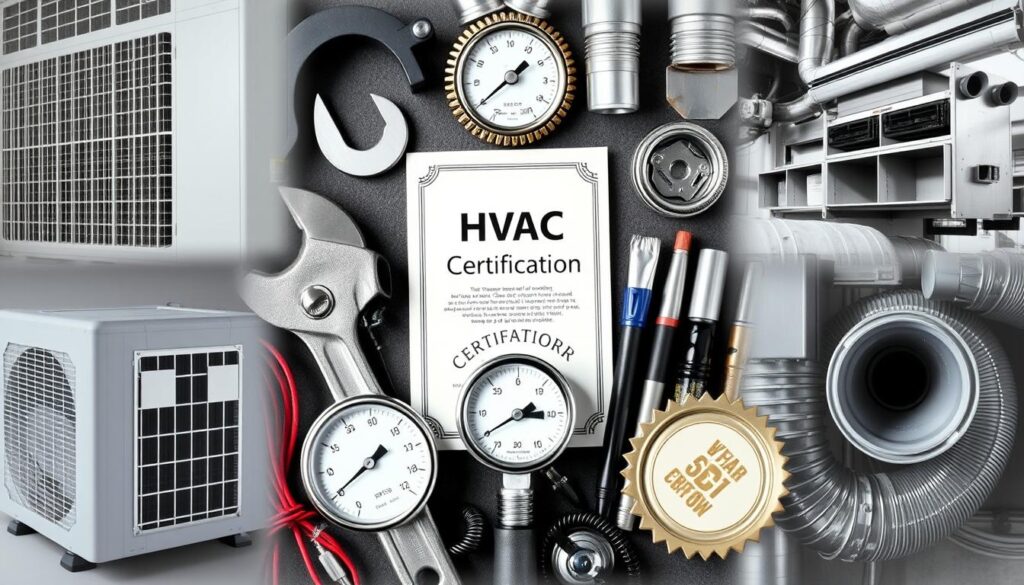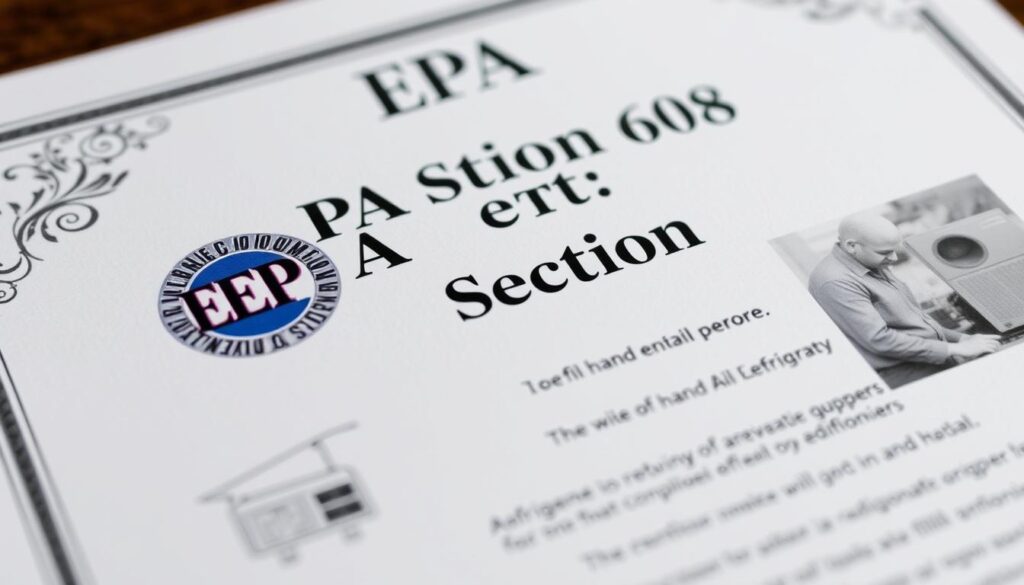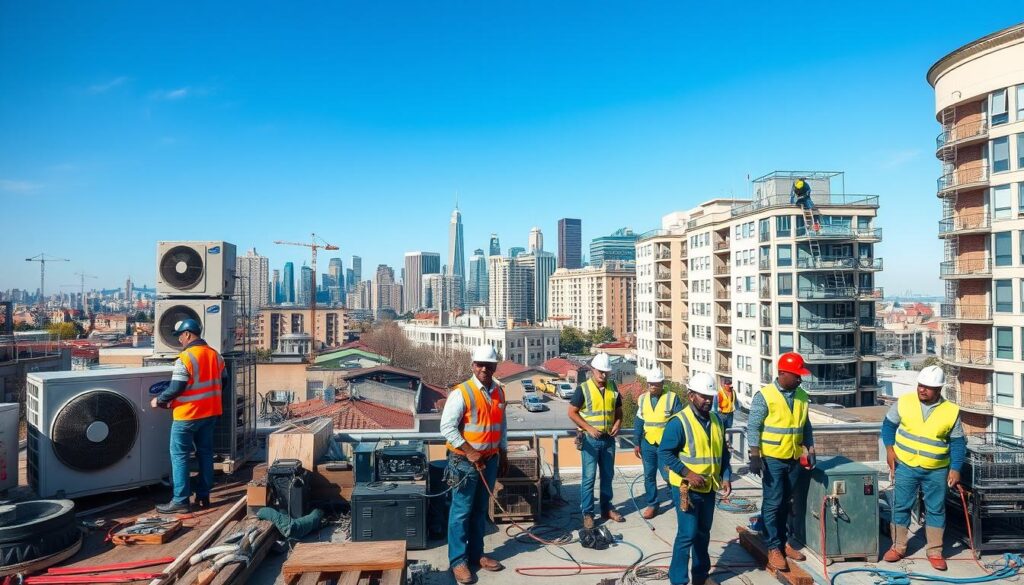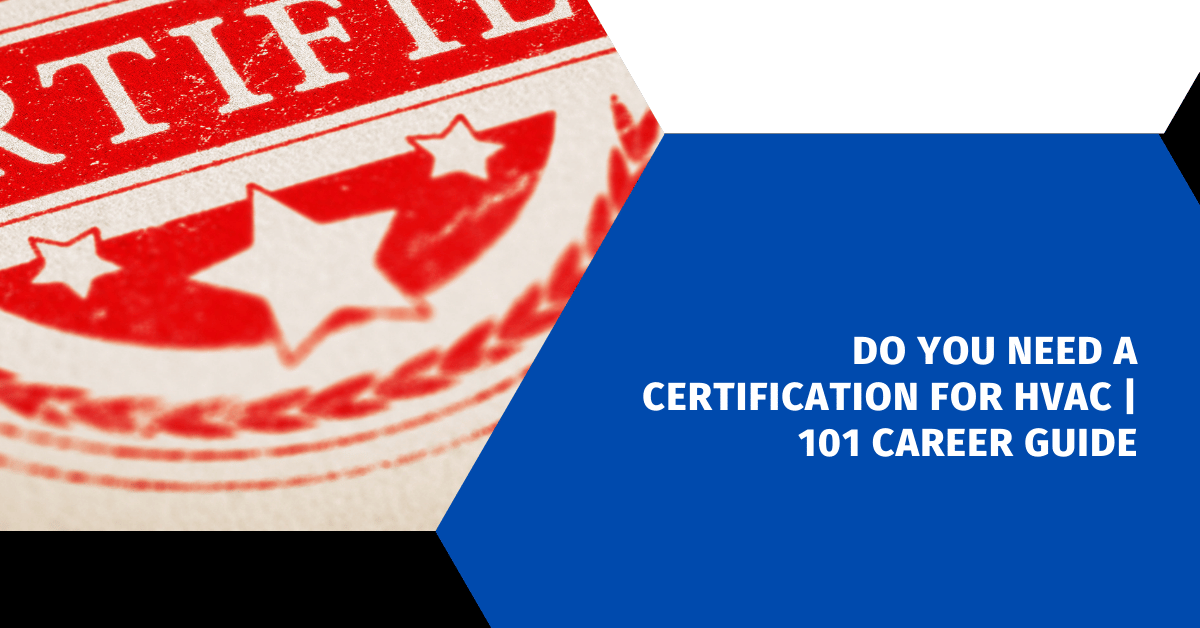Affiliate Disclosure
HVAC Guide Guys is a participant in the Amazon Services LLC Associates Program, an affiliate advertising program designed to provide a means for sites to earn advertising fees by advertising and linking to Amazon.
Do You Need a Certification for HVAC? Did you know the Bureau of Labor Statistics predicts a 4% growth rate for HVAC technician jobs by 2026? This booming industry is creating a huge demand for skilled professionals. HVAC certification is a valuable asset for anyone starting a rewarding career.
While certification isn’t mandatory in all states, it offers big advantages. These include better job opportunities, higher earning potential, and increased competency. The certification process varies by state. It usually involves completing an accredited HVAC program, gaining practical experience, and passing relevant exams.

Key Takeaways
- HVAC technician jobs are projected to grow by 4% through 2026.
- Certification can open doors to better job opportunities and higher salaries.
- The certification process typically includes completing an HVAC program, gaining practical experience, and passing exams.
- Certification requirements vary by state, with some states requiring specific licenses or certifications.
- HVAC technicians in the US can earn between $14.94 and $30.58 per hour, with a median annual wage of $48,730 in May 2019.
Table of Contents
Understanding HVAC Technician Career Basics
HVAC technicians do more than just fix heating and cooling systems. They need to understand blueprints, use special tools, and test systems. They keep places comfortable and safe for everyone.
Job Responsibilities and Daily Tasks
HVAC techs work with many things like pumps, wires, and chemicals. They use computers and talk to customers. It’s important to explain things in simple terms.
They often face tough conditions like heavy machinery and bad weather. They must manage their time well, working nights and weekends. This is to meet customer needs quickly.
Industry Growth and Career Outlook
The hvac career outlook looks good. The Bureau of Labor Statistics says jobs will grow 15% by 2029. This is because of the need for energy-efficient systems and skilled workers.
Average Salary Expectations
HVAC techs make about $50,590 a year, on average. Their pay can range from $14.94 to $30.58 an hour. Training takes 6 months to a year, which is faster than getting a bachelor’s degree.
| Top 10 Areas with Highest Job Growth for HVAC Technicians | Projected Growth Rate |
|---|---|
| Utah | 31.1% |
| Nevada | 30.1% |
| Colorado | 29.7% |
| Guam | 26.3% |
| Arizona | 21.4% |
| Iowa | 18.5% |
| Montana | 18.5% |
| Oregon | 18.5% |
| Arkansas | 16.3% |
| Florida | 16.2% |
Do You Need a Certification for HVAC
Federal law doesn’t require HVAC certification, but many states have their own rules. Getting the right certifications can really help your HVAC career.
The EPA Section 608 Technician Certification is key for HVAC techs. It’s needed for anyone working with refrigerants. This ensures they handle refrigerants safely, protecting the environment.
Voluntary certifications, like those from NATE (North American Technician Excellence), can also boost your career. They show you’re skilled in certain HVAC areas. This makes you more appealing to employers.
| Certification | Focus | Benefits |
|---|---|---|
| EPA Section 608 | Refrigerant handling | Mandatory for HVAC technicians, ensuring environmental responsibility |
| NATE Certification | Specific HVAC system expertise | Validates technical competency, improves credibility and job prospects |
| HVAC Excellence | Comprehensive HVAC knowledge | Demonstrates extensive HVAC expertise, including installation and troubleshooting |
| RSES Certification | Advanced refrigeration and air conditioning | Provides in-depth understanding of refrigeration and air conditioning systems |
Even though there’s no federal rule, hvac certification requirements can differ a lot by state and city. It’s crucial to check the epa certification for hvac and licensing rules in your area. This way, you can make sure you meet all the requirements and open up more career doors in the HVAC field.
Explore Our HVAC Shop
Looking for top-rated HVAC tools, parts, and accessories? Visit our shop and find the perfect solution for your needs.
Visit the ShopEssential Educational Requirements for HVAC Professionals
To become an HVAC (Heating, Ventilation, and Air Conditioning) professional, you need both technical education and hands-on training. The exact education needed can change based on where you are. But, there are a few main ways to start your HVAC career.
High School Diploma Prerequisites
First, you must have a high school diploma or GED. In high school, taking classes in computer science, physics, math, and shop classes is helpful. These subjects lay a solid base for HVAC work.
Trade School and Community College Programs
After high school, many choose to go to trade school or community college. These programs last about 9 months and give you a specialized HVAC certificate or diploma. You’ll learn about installing, maintaining, and fixing HVAC systems, plus electrical, refrigeration, and ductwork skills.
Apprenticeship Opportunities
- HVAC apprenticeships last 3 to 5 years. They mix on-the-job training with classroom learning.
- Apprentices work with experienced HVAC techs, getting real-world experience and earning a salary.
- These programs are often backed by local HVAC contractors or unions. They offer a clear path to becoming a skilled HVAC technician.
No matter your educational path, HVAC pros must keep up with new industry standards, tech, and safety rules. This means ongoing training and certification.
| HVAC Training Program | Duration | Average Cost |
|---|---|---|
| Trade School Certificate | 9 months | $1,200 – $15,000 |
| Community College Diploma | 9 months | $500 – $30,000 |
| HVAC Apprenticeship | 3 – 5 years | Earn a salary during the program |
Explore Our HVAC Shop
Looking for top-rated HVAC tools, parts, and accessories? Visit our shop and find the perfect solution for your needs.
Visit the ShopEPA Section 608 Certification Requirements
For HVAC technicians, the Environmental Protection Agency (EPA) requires a Section 608 Technician Certification. This is a key requirement in the HVAC field. It comes in four types:
- Type I – for servicing small appliances with 5 pounds or less of refrigerant
- Type II – for high-pressure appliances with more than 5 pounds but less than 100 pounds of refrigerant
- Type III – for low-pressure appliances with more than 100 pounds of refrigerant
- Universal – for all types of refrigerant equipment
To get certified, technicians must pass a detailed written exam. The exam covers many topics, like equipment rules, safety, and refrigerant types. Once certified, the EPA Section 608 Certification is good for life, unless the EPA takes it away for breaking rules.
| Certification Type | Refrigerant Capacity |
|---|---|
| Type I | 5 pounds or less |
| Type II | More than 5 pounds, less than 100 pounds |
| Type III | More than 100 pounds |
| Universal | All types of refrigerant equipment |
The EPA 608 certification exam is a closed-book test with a two-hour time limit. It has strict rules for breaks and talking during the exam. To pass, you need a score of 70% or higher in a proctored setting, or 84% in a non-proctored setting for the Core and Type I sections. Getting a Universal certification means you’ve passed all four sections. This makes you qualified to work on any HVAC system and handle different refrigerants while following EPA rules.

Explore Our HVAC Shop
Looking for top-rated HVAC tools, parts, and accessories? Visit our shop and find the perfect solution for your needs.
Visit the ShopTypes of HVAC Certifications and Licenses
Starting a career in HVAC means knowing about different certifications and licenses. The HVAC field has many certifications and state rules that affect your job and pay. It’s key to understand these to move forward in your career.
NATE Certification Options
The North American Technician Excellence (NATE) certification is well-known in HVAC. NATE has various tests, like installation and servicing, and specialty areas. Getting NATE certified can open doors to higher-paying jobs and more money, showing you know your stuff.
State-Specific Licensing Requirements
Licensing for HVAC techs varies by state in the U.S. Some states don’t need a special license, but others are stricter. For example, in California, you need four years of experience and pass a big exam to be a contractor.
Specialty Certifications Available
There are also specialty certifications in HVAC. These cover things like commercial furnaces and heat pump pool heaters. Getting these can help you offer more services and make more money.
Whether you’re new to HVAC or want to grow in your career, knowing about certifications and licenses is crucial. By getting the right credentials, you can succeed in the HVAC industry.
State-by-State HVAC Licensing Guidelines
Getting an state hvac license or hvac licensing in the U.S. varies by state. Some places like Illinois, Colorado, and New York don’t need state licenses. But, others have strict rules for HVAC workers.
In Texas, HVAC techs must pass the NATE exam and register with the state. Delaware has a tiered program for HVAC licenses. Alaska requires separate licenses for electrical and plumbing work in HVAC.
It’s key for HVAC pros to know the licensing rules in their work states. Not getting the right state hvac license or hvac licensing can lead to fines, legal trouble, or lawsuits.
“100% of states in the U.S. have differing requirements for obtaining an HVAC license.”
The cost of getting an HVAC license or certification varies. It can be a few hundred to a few thousand dollars. Also, 58% of states require an exam for an HVAC license. 40% of states have agreements for licenses from other states.
The HVAC industry is growing by 4% by 2029, says the U.S. Bureau of Labor Statistics. Keeping up with state hvac license and hvac licensing rules is vital for a successful HVAC career.
HVAC Certification and Training Programs
Getting into an HVAC training program is key for those wanting to be HVAC techs. These programs last 6 to 9 months. They teach a lot, getting you ready for the industry’s tests.
Program Duration and Costs
HVAC programs usually last 6 to 9 months. The price can be from a few thousand to over ten thousand dollars. This depends on the school and how long the program is. Some, like Summit College, can finish in just 9 months.
Course Curriculum Overview
HVAC training covers many subjects. You’ll learn about refrigeration, electricity, and more. You’ll also get into air conditioning, heating systems, and blueprint reading. Plus, you’ll learn about safety, renewable energy, and business management.
| Certification | Duration | Cost |
|---|---|---|
| EPA 608 Certification | 1-2 weeks | $100-$300 |
| NATE Certification | 3-6 months | $200-$500 |
| Manufacturer-Specific Certification | 1-3 months | $50-$500 |
| State or Local Licensing | 6 months to 2 years | Varies by state |
Finishing an HVAC training program gives you the skills for a career in HVAC. You’ll be ready to meet the industry’s certification needs.
Explore Our HVAC Shop
Looking for top-rated HVAC tools, parts, and accessories? Visit our shop and find the perfect solution for your needs.
Visit the ShopBuilding Your Career Path in HVAC
The hvac career outlook is bright, with a 15% job market growth expected by 2026, says the Bureau of Labor Statistics. With an hvac technician certification, you can start a fulfilling career in HVAC. You’ll move from entry-level to specialized and leadership roles.
Starting your HVAC career means getting hands-on experience after getting certified. By learning more and getting extra certifications, you can focus on commercial systems or green tech. Many technicians become supervisors or even start their own HVAC companies, using their skills and drive.
Keeping up with HVAC’s changing tech and rules is key. Staying current will boost your knowledge and job chances.
| Career Stage | Experience Level | Typical Roles | Average Hourly Wage |
|---|---|---|---|
| Entry-Level | Less than 1 year | HVAC Technician Apprentice | $22.47 |
| Mid-Level | 3-6 years | HVAC Technician, Specialist | $25-$30 |
| Senior-Level | 7+ years | HVAC Supervisor, Contractor | $32.83 |
The HVAC field is full of chances for those who keep learning and growing. By always learning and improving, you can set yourself up for a successful and fulfilling HVAC career.

Explore Our HVAC Shop
Looking for top-rated HVAC tools, parts, and accessories? Visit our shop and find the perfect solution for your needs.
Visit the ShopInvestment and Costs Associated with HVAC Certification
Getting an HVAC certification has its costs, but it’s worth it for your career. The prices vary based on the certification type and who gives it out.
For HVAC licensing, you’ll pay between $50 to $300 for a two- or three-year license. EPA Section 608 certification exams cost from $20 for a Type I to over $150 for a Universal exam. You’ll also spend on study materials, ongoing education, and renewal fees.
- HVAC licensing fees: $100 to $300 for the first year’s annual fee, $50 to $150 for every year following the first year
- HVAC exam fees: range from $50 to $150
- EPA 608 certification exam fees: between $40 and $240 for different types of certification exams
There are also educational costs to consider. HVAC certificate programs can cost $1,200 to $15,000 and last 6 to 12 months. An associate’s degree in HVAC might cost $15,000 to $35,000 and take 18 to 24 months.
Apprenticeship programs offer on-the-job training for $500 to $2,000 over 3 to 5 years. You can get help with these costs through federal loans, grants, and scholarships.
In the end, investing in HVAC certification and training can lead to a fulfilling career. With competitive salaries and good job prospects, understanding the costs helps you plan for your HVAC career.
Conclusion
Getting an HVAC certification is a smart move for a rewarding career. The rules for getting certified can change by state. But, getting the right certifications can lead to better jobs, more money, and more respect in your field.
The HVAC world is always changing with new tech and rules. It’s crucial to keep your certifications current. This ensures you stay ahead in your career.
If you’re new to HVAC or want to grow in your career, this guide can help. It covers the hvac certification requirements and how to get there. With the right training and effort, you can thrive in this field. The hvac career outlook looks bright.
Keep in mind, the HVAC field is always evolving. To succeed, you must stay updated and flexible. By constantly learning and improving, you’ll stand out. This will help you grab the many opportunities the HVAC industry offers.

